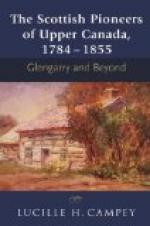A temporary house for eight persons was built in a convenient part of the maple woods, distant about three miles from the fort. The men then gathered the bark of white birch trees, and made out of it vessels to hold the sap which was to flow from the incisions they cut in the bark of the maple trees. Into these cuts they introduced wooden spouts or ducts, and under them were placed the birch-bark vessels. When these were filled, the sweet liquid was poured into larger buckets, and the buckets were emptied into bags of elkskin containing perhaps a hundred gallons. Boilers (probably of metal, introduced by the French) were next set up in the camp over fires kept burning day and night, and the maple sap thus boiled became, by concentration, maple sugar.
The women attended to all the business of sugar manufacture, while the men cut wood and went out hunting and fishing to secure food for the community; though, as a matter of fact, sugar and syrup were their main sustenance during all this absence from home. “I have known Indians”, wrote Henry, “to live for a time wholly on maple sugar and syrup and become fat.” The sap of the maple had certain medicinal qualities which were exceedingly good for persons who had previously been eating little else than meat and fish, so that the three weeks of sugar-boiling in Canada was, no doubt, a splendid assistance to the health of the natives. On this particular occasion described by Henry, the party returned, after three weeks’ absence, to the Sault Ste Marie with 1600 lb. of maple sugar, and 36 gallons of syrup.[4]
[Footnote 4: There are at least two species of maple in Canada yielding sugar from their sap; but the best is Acer saccharinum. The maple leaf is the national emblem of Canada.]
Henry returned in the summer of 1763 to Fort Michili-makinak. The place was then held by a British garrison under Major Etherington. Shortly after Henry’s arrival, an Ojibwe chief named Wawatam came often to his lodgings, and, taking a great fancy to the Englishman, asked leave to become his blood brother. He was about forty-five years of age, and of an excellent character amongst his nation. He warned Henry that he, Wawatam, had had bad dreams during the winter, in which he had been disturbed “by the noises of evil birds”, and gave him other roundabout warnings that the Indians of different tribes were going to attack the British garrison at Michili-Makinak, and endeavour to destroy all the English in Upper Canada. Henry did not pay over much attention to this warning, because “the Indian manner of speech is so extravagantly figurative”.




